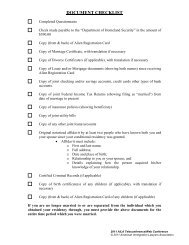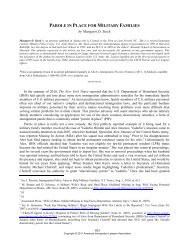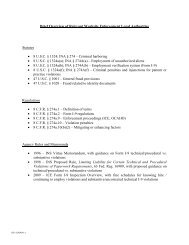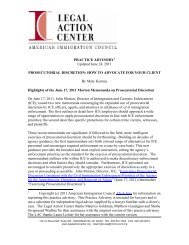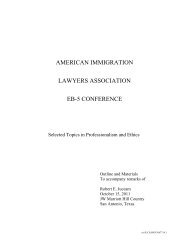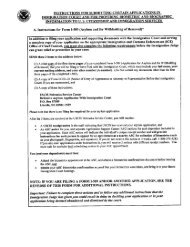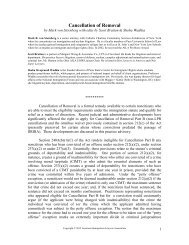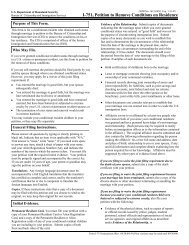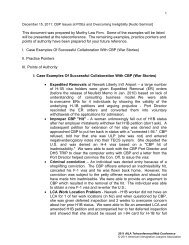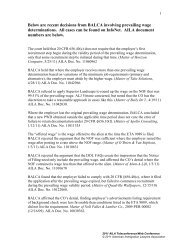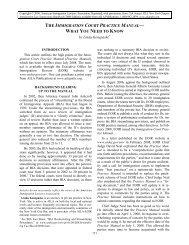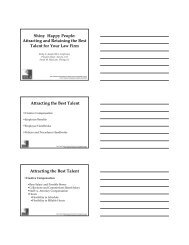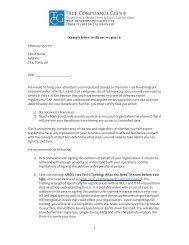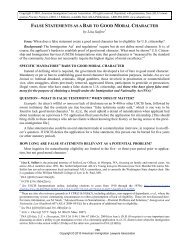Resources for 04-26-11 Seminar - AILA webCLE
Resources for 04-26-11 Seminar - AILA webCLE
Resources for 04-26-11 Seminar - AILA webCLE
Create successful ePaper yourself
Turn your PDF publications into a flip-book with our unique Google optimized e-Paper software.
WAC 07 277 53214Page 19See 56 Fed. Reg. 6<strong>11</strong><strong>11</strong> (December 2, 1991)(Final Rule).Since Congress enacted the statutory definition of "specialized knowledge," the agency has issued a numberof internal memoranda discussing the term specialized knowledge. See Memorandum of James A. Puleo,Acting Exec. Assoc. Comm., INS, "Interpretation of Special Knowledge," (March 9,1994); Memorandum ofFujie Ohata, Assoc. Comm., INS, "Interpretation of Specialized Knowledge" (Dec. 20, 2002); Memorandumof Fujie Ohata, Director, Service Center Operations, USCIS, "Interpretation of Specialized Knowledge <strong>for</strong>Chefs and Specialty Cooks seeking L-1B Status," (Sept. 9,20<strong>04</strong>).As noted by counsel, the Puleo memorandum of 1994 is often cited as the key agency document relating tothe adjudication of L-1 B specialized knowledge visa petitions. Addressed to the various directors ofthe INSoperational components, the internal agency memorandum noted that the 1990 Act statutory definition was a"lesser, but still high, standard" compared to the previous regulatory definition and declared that thememorandum was issued to provide guidance on the proper interpretation ofthe new statutory definition.The memorandum advised INS officers to apply the common dictionary definition ofthe terms "special" and"advanced," since the statute and legislative history did not provide insight as to the interpretation ofspecialized knowledge. Looking to two different versions of Webster's Dictionary, the memorandum definedthe term "special" as "surpassing the usual; distinct among others of a kind" or "distinguished by someunusual quality; uncommon; noteworthy." Puleo memorandum at p.1. The memorandum relied on the samedictionaries to define "advanced" as "highly developed or complex; at a higher level than others" or "beyondthe elementary or introductory; greatly developed beyond the initial stage." Id. at p.2.The Puleo memorandum provided various scenarios, hypothetical examples, and a list of six "possiblecharacteristics" that would indicate specialized knowledge. Adding a gloss beyond the plain language of thestatute or the definitions of "special" and "advanced," the memorandum surmised that specialized knowledge"would be difficult to impart to another individual without significant economic inconvenience." Id. at p.3.The memorandum also stressed that the "examples and scenarios are presented as general guidelines <strong>for</strong>officers" and that the examples are not "all inclusive." Id. at pp. 3-4.The Puleo memorandum concluded with a note about the burden of proof and evidentiary requirements <strong>for</strong>the classification:From a practical point of view, the mere fact that a petitioner alleges that an alien'sknowledge is somehow different does not, in and of itself, establish that the alien possessesspecialized knowledge. The petitioner bears the burden of establishing through thesubmission of probative evidence that the alien's knowledge is uncommon, noteworthy, ordistinguished by some unusual quality and not generally known by practitioners in the alien'sfield ofendeavor. Likewise, a petitioner's assertion that the alien possesses an advanced levelofknowledge ofthe processes and procedures ofthe company must be supported by evidencedescribing and setting apart that knowledge from the elementary or basic knowledgepossessed by others. It is the weight and type of evidence, which establishes whether or not



